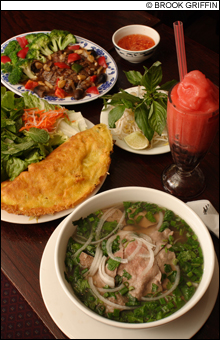
PHO BUSINESS The Vietnamese dishes at Phò are authentic, while the Chinese ones are quite decent.
|
Since the original Pho Pasteur opened in 1992, Boston and Dorchester have become home to numerous small restaurants whose names begin with “pho,” the beef noodle soup of Hanoi that is now one of the most popular crossover dishes in Vietnamese-American restaurants. I noticed Phò Hóa because it was larger than its counterparts and has a more extensive menu. Only later did I learn that there are more than 100 Phò Hóas in an international chain. As far as I can tell, the restaurant’s core Vietnamese dishes remain authentic and the Chinese ones are quite decent.
In fact, my favorite appetizer, although listed as an entrée, was the Hong Kong specialty: fried squid with spiced salt ($9.95). The portion wasn’t vast, but the squid was nicely cut, fresh, and perfectly fried, crisp but not oily. It was served Vietnamese style, with quite a lot of salad, which is typically eaten in the same bite with meat or seafood in order to get all the textures and flavors at once.
Another surprise: my favorite soup here was not the excellent pho, but the truly extraordinary “soup bo,” which was served as part of the “beef seven courses” ($29.95 for two). Unlike pho, which is spiked with anise, soup bo is based on a pure beef stock that picks up nuances from black mushrooms, sliced baby-corn ears, fresh peas, cilantro, and even a dropped egg.
Let’s get back to the appetizers though. The lotus rootlet salad ($6.95) here is based not on large chewy lotus roots sliced into disks, but on delicate smaller roots that make a pickled fish-sauce salad, with carrot, red pepper, shredded Asian basil, and a few shrimp chips on the side. The shrimp spring rolls ($3.50) are soft-skinned “summer rolls” with perhaps too much vermicelli among the shrimp, mint leaves, and carrots inside. But the grilled-pork spring rolls ($3.95) work a lot better because the strong flavor of the browned pork pulls the filler ingredients into line. Grilled-pork meatballs ($4.95), is a terrific appetizer of six nicely seasoned ground pork golf balls (on two skewers), with enough salad to wrap the meatballs.
Coming back to the all-important pho; there are 19 kinds, mostly permutations of various mix-ins. I always have phò dãc biét ($3.95/appetizer; $5.25/small; $5.95/large; $6.95/extra-large), which combines several kinds of round, flank, and brisket slices; tripe; softened tendon and such, with the usual spiced beef broth, onions, scallions, cilantro, rice noodles, and mix-ins of lime slice, bean sprouts, and Asian basil. Some people also add table condiments:
Hoisin sauce, Sriracha pepper sauce, salt, pepper, soy sauce, and fish sauce. Despite all of these options, my first measure of good soup is the stock, and Phò Hóa’s has real beefy flavor, touched up with star anise and a bit of caramel. The usual size here translates to “large,” so it’s a big enough meal for almost anyone.
If that seems like too much beef, you can opt for pho ga (same prices), which is chicken soup. Beef soup is considered medicinal in Vietnamese culture, so the chicken soup compensates with a medicinal seasoning of cinnamon and ginger. There’s only chicken meat in a chicken pho, so you don’t have a lot of choices.
Non-soup entrées run from rice plates to vermicelli bowls, to stir-fried noodles, to shared dishes one might order in a Chinese restaurant, to large fondues for two or more. On one visit we tried the stir-fried noodles with shrimp ($7.25), which was a mild Chinese-style dish with broccoli, red peppers, pea pods, onion, and bamboo shoots. But “boiled spicy seasoned shrimp” ($8.75), which sounded so bad I had to try it, turned out to be an excellent dish of shrimp in a three-star hot sauce with hints of lemongrass and ginger, flavoring vast amounts of fragrant white rice. If you’re not a salad eater and you’re looking for vegetables, look no further than stir-fried Chinese broccoli ($7.95). It’s almost all stem, but makes up for it with a special sweet flavor. The treatment is a mild garlic-soy based sauce.
Now, here’s the rest of the sequence on the seven-course beef. Act II brings a bowl of hot water and a beautiful plate of thin-sliced beef rounds served with limes. It comes on a large plate of lettuce, cress, onions, carrots, cucumbers, rice vermicelli, and mint, with three dips: one based on fish sauce, one on a fermented bean sauce, and the third on a truly deadly (but delicious) chili paste. Then there’s a stack of rice-paper rounds. The idea is to dip the rounds in the water to soften them, and then assemble rolls of raw beef salad. You can also cook the beef in the water, but it really works better raw.